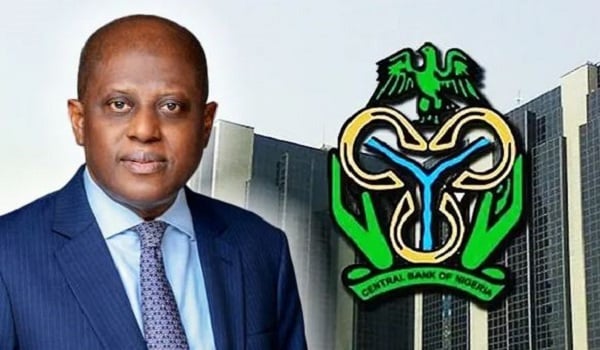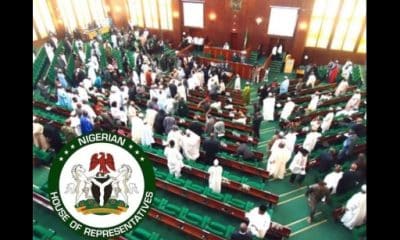Nigeria News
Grumbling In CBN As Directors Kick Over ‘Cardoso Women’ Salaries, Roles

The presence, operations, and compensation of certain women hired by Central Bank of Nigeria (CBN) Governor Olayemi Cardoso have sparked controversy within the Apex bank.
Senior staff members across the CBN’s 29 departments have expressed concerns over the influence these women—brought in by Governor Cardoso as consultants—wield within the institution. According to insiders, they have amassed significant power, to the extent of issuing directives to departmental directors.
Additionally, widespread frustration has emerged over what some staff members describe as “excessively high and unjustifiable” compensation for the consultants, who reportedly receive hefty monthly salaries.
Cardoso assumed office as CBN governor on September 22, 2023. Some sources claim that the women arrived at the bank with him on the same day, while others say they joined shortly after. Their continuous presence has fueled speculation regarding their roles, contributions, and the justification for their large paychecks.
The individuals at the center of this controversy include Nkiru Balonwu, founder of The Africa Soft Power Group, and Daphne Dafinone, a chartered accountant and chief operating officer of Crowe Dafinone, a Nigerian accounting firm.
A third consultant, Shola Phillips, formerly of Citibank, is also part of the group, but sources indicate that her presence has not been as disruptive or controversial as that of her colleagues. Details regarding her terms of engagement remain unclear.
Within the bank, the consultants are now referred to as the “Cardoso women.” One official, when Premium Times asked about the meaning behind the nickname, implied that it was self-explanatory.
Several directors have alleged that Cardoso hired the consultants arbitrarily, bypassing standard procedures and without setting clear terms of reference, deliverables, or timelines for their consultancy roles.
For instance, questions have been raised about the appointment of Ms. Balonwu as a corporate communication consultant, despite the CBN already having a well-equipped corporate communication department led by a director responsible for overseeing internal and external communication.
Similarly, insiders say that Ms. Dafinone’s consultancy role remains undefined, as she reportedly takes on any responsibility assigned to her by Cardoso. One of her recent assignments was overseeing a controversial early exit program aimed at encouraging at least 1,000 employees to opt for voluntary retirement. The governor allegedly entrusted her with this task while bypassing the bank’s human resources department, which is officially responsible for managing employee policies and processes.
The CBN has four deputy governors: Emem Usoro (Corporate Services Directorate), Muhammad Dattijo (Economic Policy Directorate), Philip Ikeazor (Financial System Stability Directorate), and Bala Bello (Operations Directorate). However, staff members now mockingly refer to Ms. Balonwu and Ms. Dafinone as the fifth and sixth deputy governors, suggesting that their influence rivals that of the officially appointed deputies.
According to some directors, the consultants have begun writing memos on CBN letterheads and issuing directives despite having no official role within the bank’s established structure.
“They claim to be consultants, but they have permanent offices in the bank with no set duration for their consultancy,” one director told Premium Times. “They even have offices on the eleventh floor alongside the governor, while the deputy governors are housed on the tenth floor. They bypass the deputy governors and issue instructions directly to directors.”
Another insider corroborated this, recalling an instance where one of the consultants allegedly boasted that even the governor could not challenge her authority.
Allegations of Exorbitant Salaries
Concerns have also been raised about the consultants’ salaries, which some staff members describe as excessive. Reports indicate that Ms. Balonwu earns N50 million per month—higher than the salaries of the governor and deputy governors combined. Her monthly pay also surpasses the combined earnings of 15 directors, who reportedly earn less than N3 million each.
Similarly, Ms. Dafinone is said to earn N35 million monthly, an amount greater than the combined salaries of 10 directors.
A staff member criticized the governor for awarding such salaries to his associates, stating that even former CBN governor Godwin Emefiele, despite his controversies, did not engage in such practices.
“These women contribute nothing to the bank,” the staff member claimed. “The governor is simply enriching his associates. There are 29 directors, 170 deputy directors, and over 400 PhD holders at the CBN—there is no need for in-house consultants.”
Hiring Procedures Under Scrutiny
Nigeria’s Public Procurement Act 2007 stipulates that government agencies must follow a transparent and competitive process when hiring consultants.
The law mandates that consultancy positions be publicly advertised in at least two national newspapers and the official procurement journal, with clear submission guidelines, defined terms of reference, and structured evaluation criteria.
Proposals must be evaluated based on technical expertise and cost-effectiveness, ensuring that only qualified candidates are selected through a fair and accountable process.
However, the hiring of the so-called consultants at the CBN appears to have circumvented these procedures, raising concerns about transparency and the proper use of public funds.
Legal Troubles Surrounding Dafinone
Meanwhile, Ms. Dafinone is facing legal proceedings related to an alleged N100 million fraud case. She is set to appear before Justice Ibrahim Kala of the Federal High Court in Lagos on March 4.
Her company, CEDDI Corporation Limited, is also named in the case, with allegations that she conspired to defraud real estate developer Lukman Adeleke in a 2019 property transaction.
Court records show that Mr. Adeleke paid N100 million for a property at 93 Broad Street, Lagos Island, but Ms. Dafinone allegedly sold the property to another buyer.
Attempts to resolve the dispute outside court failed, prompting Mr. Adeleke to seek legal redress.
According to reports, Ms. Dafinone was absent from the most recent court hearing, with her lawyer, Dapo Akinosun, informing the judge that she was receiving medical treatment in London.
Despite her ongoing legal battle, Ms. Dafinone continues to serve in her role at the CBN and was also appointed to the board of the Nigerian Incentive-Based Risk Sharing System for Agricultural Lending (NIRSAL)—a CBN-owned financial institution tasked with managing agribusiness-related credit risks in Nigeria.
Silence from CBN and Consultants
Attempts by Premium Times to reach the consultants for comments were unsuccessful.
Ms. Dafinone did not respond to phone calls, WhatsApp messages, or text messages. Similarly, efforts to contact Ms. Balonwu proved futile, as her phone line was unreachable, and she did not respond to a WhatsApp call or an iMessage.
Meanwhile, CBN spokesperson Hakama Ali was also unreachable, and she did not respond to inquiries via phone, text, or email.












